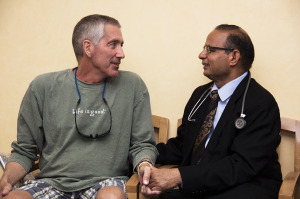Bronchial Carcinoid Tumor
Bronchial carcinoid tumors are rare, slow growing lung tumors. Some patients suffering from bronchial tumors do not experience detectable symptoms for some time, and are sometimes diagnosed as a result of diagnostic testing performed for an unrelated, secondary pulmonary condition or illness. When carcinoid tumors in the lungs do present symptoms, the most common are:
- Chest pain and difficulty breathing/shortness of breath
- Wheezing
- Coughing (sometimes accompanied by blood)

Bronchial Carcinoid Tumor
Large bronchial tumors can potentially obstruct the airway and cause pneumonia. In cases where a patient develops pneumonia before the lung cancer has been diagnosed, a chest CT or X-ray, or failure of the pneumonia to respond to and clear up with antibiotics can lead to the discovery of the carcinoids in the lungs.
Carcinoid tumors contain neuroendocrine cells, and some lung carcinoids can produce hormone-like substances that lead to hormone-related symptoms, such as:
- Tachycardia (accelerated heart rate)
- Wheezing
- Diarrhea
- Flushed, warm facial complexion
In very rare cases, the carcinoids may produce the hormone ACTH, which over-stimulates cortisol production in the adrenal glands. Cortisol is a stress hormone, and can produce its own set of symptoms including:
- Weight gain
- Drowsiness/weakness/fatigue
- Diabetes/high blood sugar
- High blood pressure
- Easy bruising
- Increased facial and body hair growth
While experiencing one or even several of the above symptoms does not necessarily indicate the presence of carcinoid tumors, bringing any new symptoms to the attention of a physician is important in order to rule out potentially serious health problems.
Who is at risk for developing bronchial carcinoid tumors?
Like all forms of cancer, there are certain hereditary, biological, and lifestyle factors that could potentially increase the chances that someone will develop lung cancer. While it is not possible to predict who will get cancer and when with any level of certitude, patients and their oncologists and health care teams can use the information currently available on the risk factors that apply to them in order to make educated decisions about preventive care and the appropriate lifestyle modifications.
Although a person may not be able to change their family history or inherited genetic mutations, they can choose not to smoke and to engage in healthy lifestyle habits such as eating a healthy, balanced diet, managing stress, and getting regular exercise.
Some of the risks factors believed to be associated with lung cancer include:
- -Gender (more common in women)
- Race/ethnicity (more common among Caucasians)
- Age (average age of diagnosis tends to be around 60, but this type of lung tumor can technically affect people at any age)
- Family history – Although this is a rare form of lung cancer, the risk can increase for individuals with family members also diagnosed with bronchial carcinoids
- Tobacco – According to the American Cancer Society, certain atypical lung carcinoids appear to be more common among smokers
- Multiple endocrine neoplasia type 1 (MEN1) – People who suffer from this condition can be at higher risk for developing tumors in endocrine glands and bronchial carcinoids
Next, read Early Signs of Lung Cancer


